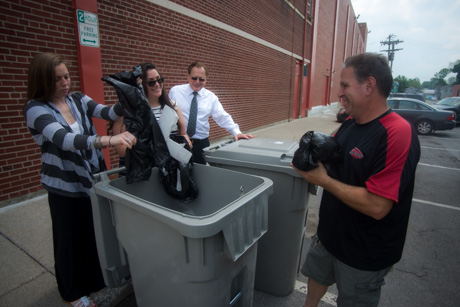
If you’ve been hanging onto old paperwork, uncertain about what to do with it, there’s an option for you this week. And it’s free.
Brighton Securities is hosting a Shred Day from noon to 2 p.m. Friday in the parking lot between its office at 212 East Main St. and Main Street Pizza Co., Batavia.
“It started out as a client appreciation event, and the shred truck is pretty big. We weren’t coming close to filling it,” Branch Manager Steve Hicks said during an interview with The Batavian. “Normally, we’ve been able to say, bring as much as you’ve got.”
The company decided to open up the event beyond clients to allow others the opportunity to get rid of unnecessary paperwork and make good use of the large shredding container. This is the 11th year for Shred Day — otherwise known as document destruction and disposal day — and Hicks has been there for most every one of them, he said.
A lot of small businesses take advantage of the service, though individuals are also welcome to bring in what they have, he said. With the prevalence of identification thefts, data leaks and various scams, he has observed a hesitancy to dump one’s confidential papers.
“I’ve noticed more of an increase, and people with sensitivity, in getting rid of them,” Hicks said. “People are more sensitive to it.”
The company Shred Text does the work, and it’s a “secure, well-run” outfit, he said. People can feel confident that when they leave, their paper items will be shredded and disposed of properly, he said.
By the box or bag, it doesn’t matter how people bring their stuff in, he said, and there will be staff on hand to assist them. Some people have not even gotten out of their vehicles, as someone is there to grab their container and dump it.
“We’ve never filled the truck,” Hicks said. “We usually have snacks and water here. We do this rain or shine. Two or three years ago, it rained the whole time.”
Friday’s forecast hints at some similar wet weather, but feel free to bring your items for a shred.
Wondering how long to keep your personal or professional documents?
The following guidelines are from the Internal Revenue Service, via irs.gov:
The length of time you should keep a document depends on the action, expense, or event that the document records. Generally, you must keep your records that support an item of income, deduction, or credit shown on your tax return until the period of limitations for that tax return runs out.
The period of limitations is the period of time in which you can amend your tax return to claim a credit or refund, or the IRS can assess additional tax. The information below reflects the periods of limitations that apply to income tax returns. The years refer to the period after the return was filed unless otherwise stated. Returns filed before the due date are treated as filed on the due date.
Note: Keep copies of your filed tax returns. They help in preparing future tax returns and making computations if you file an amended return.
Period of Limitations that apply to income tax returns
Keep records for three years if situations (4), (5), and (6) below do not apply to you.
Keep records for three years from the date you filed your original return or 2 years from the date you paid the tax, whichever is later, if you file a claim for credit or refund after you file your return.
Keep records for seven years if you file a claim for a loss from worthless securities or bad debt deduction.
Keep records for six years if you do not report the income that you should report, and it is more than 25% of the gross income shown on your return.
Keep records indefinitely if you do not file a return.
Keep records indefinitely if you file a fraudulent return.
Keep employment tax records for at least 4 years after the date that the tax becomes due or is paid, whichever is later.
The following questions should be applied to each record as you decide whether to keep a document or throw it away.
Are the records connected to property?
Generally, keep records relating to property until the period of limitations expires for the year you dispose of the property. You must keep these records to figure any depreciation, amortization, or depletion deduction and to figure the gain or loss when you sell or otherwise dispose of the property.
If you received property in a nontaxable exchange, your basis in that property is the same as the basis of the property you gave up, increased by any money you paid. You must keep the records on the old property, as well as on the new property until the period of limitations expires for the year in which you dispose of the new property.
What should I do with my records for nontax purposes?
When your records are no longer needed for tax purposes, do not discard them until you check to see if you have to keep them longer for other purposes. For example, your insurance company or creditors may require you to keep them longer than the IRS does.
For more information about the event, go to www.brightonsecurities.com
Photo: File photo of shred day in 2015. Photo by Howard Owens.
